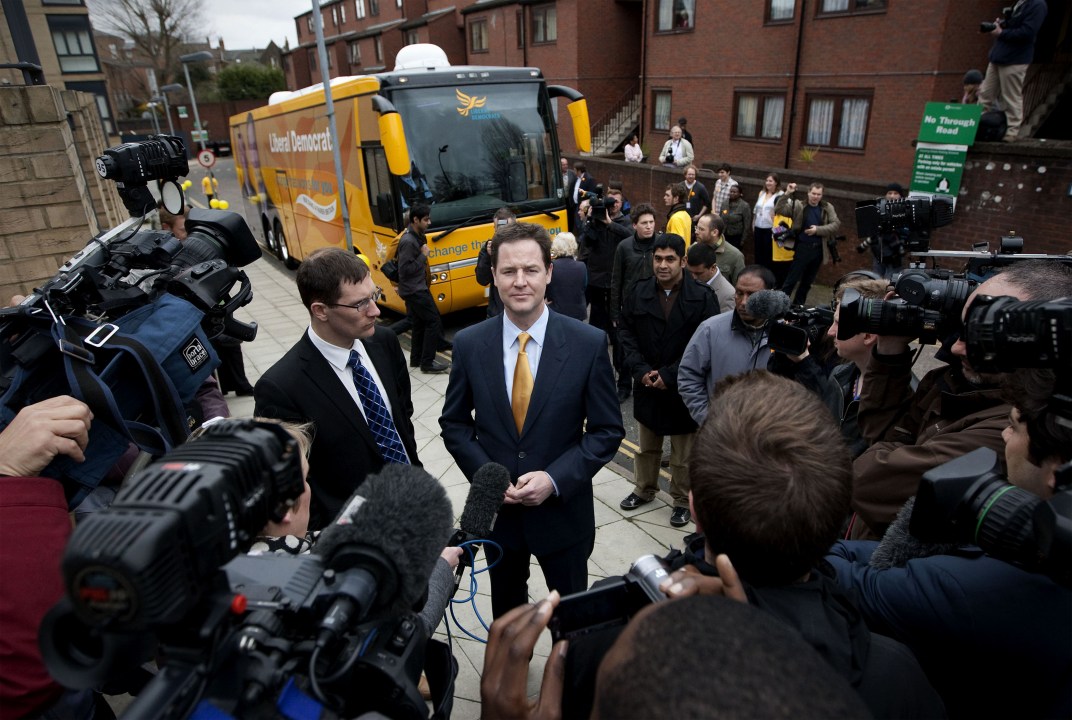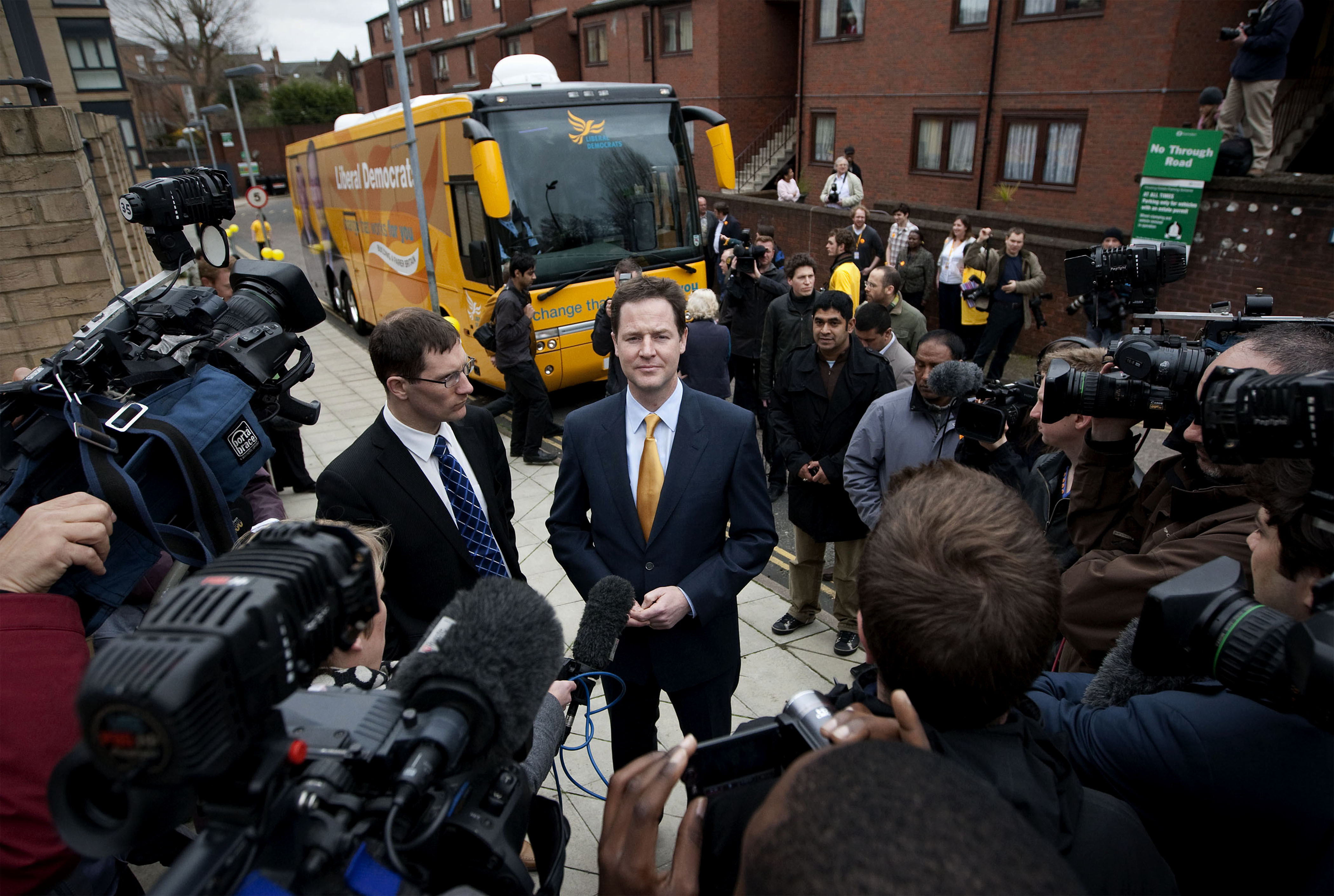 Ok, this won’t be one of my more popular opinions, but here goes … Nick Clegg is a
Ok, this won’t be one of my more popular opinions, but here goes … Nick Clegg is a
Good Politician. And I don’t mean that in some Machiavellian sense – although, for all I know, that might be true. But, rather, that he’s got some decent ideas and ideals, and he presents them convincingly. This is why he deserved his victory in yesterday’s TV debate. It wasn’t the novelty factor, as Fraser claimed last night. It wasn’t even really his plague-on-both-your-houses positioning. No, last night was the culmination of two years in which – politically speaking – Clegg has kneaded and pulled his party into one which can stand, unashamed, on a platform beside the Big
Two.
I’ve been fighting an insurgency struggle inside 22 Old Queen St, on this very point, for some time now. The naysayers point to all the gaffes and all the inconsistencies – and I can see where they’re coming from. There are several heavy caveats which need to be attached to any praise for Clegg, and they’ll run through what follows. But I still think his opponents have been all too blithe, all too casual about the Lib Dem leader. In which case, here’s my brief five point guide to why Clegg is worth taking seriously:
1. Public service reform. Sift through his speeches and articles, and Clegg is often the party leader who sounds most evangelical about public service reform. His beat is decentralisation, choice and competition. And, crucially, he has consistently pushed the fiscal case for reform – that you can get better services for less money – since even before the full horror of Brown’s debt binge came into view. I mean, howabout this passage from an article of his on the NHS:
“We’ve reached the end of the line for the Labour approach. Investment was desperately needed in 1997, after years of Conservative neglect. But it came with centrally dictated reforms, Whitehall restructuring and ministerial targets that made little sense on the ground.So, although we now spend as much as our European counterparts, health outcomes lag far behind, and inequality is worsening. Cancer survival is below the European average; we have the worst outcome for stroke patients in western Europe; and a baby born in the poorest ward of Sheffield will die 14 years before a baby born in a wealthier ward. The centralised system has failed the people who need it most.”
And there are plenty more examples besides. Yes, there are question marks about whether the Lib Dems have the policies to back this up – but in several areas, from education to welfare, they stand on solid reforming platforms.
2. Low taxes for low income earners. Since Gordon Brown ditched the 10p tax rate, there has been a economic and moral space for politicians to stand up for low-income earners. Frank Field has done it, IDS has done it – and so too has Nick Clegg. He talks about low taxes for low income earners at basically every other PMQs – and in almost every speech. And, in the Lib Dems’ plan to make the first £10,000 of income tax free, he has a policy to back up his rhetoric. Yes, it may be expensive, the sums may be optimistic. But it’s an important proposal, and perhaps the best doorstep policy of this election.
3. Spending cuts. The Lib Dems have muddied their position on spending cuts recently, by claiming that they shouldn’t be made this year. But there’s an abiding sense that Nick Clegg is more honest about the need for cuts than most of his parliamentary colleagues. I point you in the direction of his “politics of priority” speech in January. Or his talk of “savage cuts” last September. Or, last February, when he was dropping spending pledges and talking about an “age of austerity”. Even in 2008, he was displaying the logic which would lead to cuts. A speech of his in November 2008 has the line:
“We hear talk of tax cuts emerging from Downing Street, but they are likely to be small, and short term. Funded through borrowing, the money will have to be paid back later. So it’s meagre tax cuts today, giant tax rises tomorrow from Brown.”
Throw in the Lib Dem’s plans to cut big ticket items like Trident, and there’s a rich vein of hawkishness on the public finances. Pretty astonishing, really, when they’ve traditionally been a tax-and-spend bunch.
4. Non-partisan tone. Ok, Clegg does attack Labour and the Tories. He has to. And he frequently does it from a achingly sanctimonious vantage point. But I’m
frequently struck by how non-partisan he can be. For instance, he often uses PMQs for something close to what it’s designed for: asking the Prime Minister a question, rather than Party Propagnada Hour. But what I more have in mind is how he makes statements which make life easier for the other parties, as well as for his own. The “politics of priority” speech was a classic example of this: while Labour and the Tories can dwell on “U-turns” over spending , Clegg just comes right out and says that “of course we’ll have to ditch commitments – everyone will have to”. This is a message which benefits the Tories and Labour just as much as the Lib Dems.
5. Established himself. Maybe it’s just me, but he seems to have established himself fairly well in just two years. And that despite a political class which seems to
lazily obsess over that one GQ interview. The Gurkha campaign and last night’s performance will have helped in this repsect.
Ok, that’s enough of that. I know what you’re all thinking – you’re thinking about that silly walkout over the Lisbon Treaty; about that declaration that Parliament shouldn’t go on holiday over the summer (it did); about the fantasies in the Lib Dems’ fiscal projections; and so on. And you’re right. I’m not saying that Clegg is perfect. And I’m certainly not endorsing his party. My point is simply that Clegg is, in many respects, a severely underrated political figure. Many of the good apsects of his party seem to be down to his leadership. And many of the bad aspects are either a natural function of the Lib Dems, or, to my mind, a result of Vince Cable’s more questionable instincts.
Even if you don’t sign up to the above, then let’s hope Clegg’s victory in the TV debate achieves one thing: to stop the laughter and the jeering when he stands up in PMQs, often just before paying his condolences to our fallen troops in Afghanistan. As I’ve written before, that kind of thing says far more about Parliament than it does about Nick Clegg.







Comments